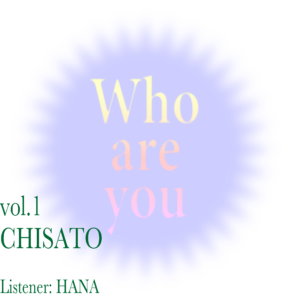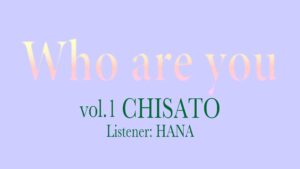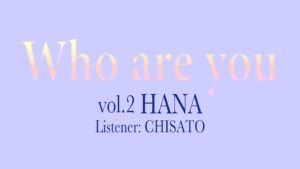Who are you / vol.1 CHISATO -ENver
Who are you / vol.1 CHISATO -ENver

”Who are you” is a content to get to know, look at, and deepen your understanding of a person. This time, we have an interview from HANA to CHISATO.
CHISATO
She is intelligent and articulate, but also has a sense of humor that makes her attractive. She has been interested in social issues since she was in elementary or junior high school, reading newspapers and pondering. She is not afraid of failure and boldly takes on any challenge. Her activities are not limited to the field of art, but also include theater, writing, and participating in business contests. Her activities are not limited to Tokyo, but also take place in various parts of Japan and even abroad. She says that her activities are rooted in her doubts and anger toward society. Through this interview, I felt fortunate to have met a woman who is more compassionate than others and has a gentle perspective to face social issues as if they were her own. As a partner of this collective and a friend, I would like to watch her as she continues to actively work to create a society in which people can breathe easier, even if only a little.
BY HANA
*Interview with CHISATO from HANA*
▶︎How did you become interested in art and culture?
I have loved writing and expressing myself through words since I was a child, and my current greatest interest is actually in the arts and literature. When I was a child, I made picture books and picture-story shows, and my compositions at school were selected. People around me told me that I had the power of words, and I began to think that I might have the power of words. This led to an interest in stories and theater, and I became involved in theater as a member of my high school club. I wasn’t really involved in the fine arts field, but I’ve always been helped mentally by culture and art, so it’s very important to me.
▶︎Before entering your current field, you were involved in theater and other business-related activities. How long have you been interested in these things?
I have been interested in social issues ever since I can remember. I read the newspaper from cover to cover every day in elementary and middle school. I was interested in business because I was interested in continuing to work directly with the world to make things happen in a practical way by actually making things and building services.
▶︎You were also involved in social issues such as refugee problems from quite early on. How did that come about?
When I was in junior high school, I was affected by the period of frequent terrorist attacks in Europe and the United States. When a Japanese journalist was killed by the Islamic State group, I was struck by it like I had been struck by a hundred thunderbolts. I began to pay attention to issues such as refugees and Islamic extremist fundamentalism that was gaining popularity at the time, and I began to think about and learn more about the relationship between the fundamental question of “What is religion and faith? At first, I wanted to study refugee issues at university, and I had a research plan.
▶︎You are studying something different now, have you had any change of heart?
I thought, “I am not fit to work in politics, economics, or journalism.” I felt uncomfortable being on the giving side and the receiving side in terms of composition, and I wanted to live with the people involved more from the same perspective. I thought that I would be able to open up a new way of thinking through culture and the arts, so I entered Aoyama Gakuin to study cultural policy. As I studied there, I began to think that I wanted to be more involved in the art scene. I decided that I wanted to approach society from a softer perspective, and so I decided to put myself in such a position at the university itself.
▶︎I know that you are now specializing in art, but does your background in theater and international affairs have any influence on your activities?
Art and society are always correlated and can affect each other. So I always want to explore the relationship between the two, which is in line with CHANEL’s theme, like how we can open a gap in society through art, and I always want to look at things not only from the perspective of art, but from all perspectives, from a multifaceted point of view. I want to look at things not only from the perspective of art, but from all perspectives.
▶︎While you were on leave, you traveled around to many places and entered many sites. What did you gain from that?
I don’t know if it’s obvious or not, but I’ve come to realize that I have to make my own way in the world. I think Corona may have had an influence on me. I couldn’t go to college for over a year and a half after Corona. I couldn’t go to college for more than a year and a half, so I stopped expecting anything or anyone else to do anything for me. But especially after I took a leave of absence, there was no such thing as college. I felt more strongly that I had to set up my own path and do things on my own, and that if I let things flow, the path would naturally open up for me, and that the only way to open up my own path was to take action, and that the circle of people around me would not expand. But I never imagined that it would be like this for half a year after I decided to take a leave of absence.
▶︎You are always full of energy and working hard, but what is your driving force?
Anger? You feel uncomfortable about many things in life, don’t you? I have friends who are queer or trans, and they call me crying because they can’t dress the way they want to. I thought, “Why? And then they are like, “Pissed off! And then they would be like, “Pissed off! So I think I have a lot of anger towards various things in a big way. I have always acted out.
▶︎Chisato, you have been thinking about society from a very early stage, what role do you think art can play in society?
I don’t really think that art can cause a tremendous change like business can. I have a feeling that art appeals to the human mind and spirit, and that what is expressed in art can be passed on from generation to generation. What I want to do is to create a place on this earth where people can breathe easier by thinking together about the fundamental things that will help us live better. If we do this through art, I think we can approach the root of the problem from the spiritual aspect.
▶︎What do you hope this collective will eventually become?
I hope it will be for everyone. Not just “our” collective, but a common place for everyone, transcending borders, ideologies, languages, and religions.
- 【速報】nowhere project始動
- ◇WORK NEWS◇ 【TPR×TCS マネジメント参加】
- PLAZA 開催! 【2023,1/29】
- PLAZA 開催! 【2022,12/22】
- PLAZA 開催! 【2022,12/12・13・14】
- 【速報】nowhere project始動
- ◇WORK NEWS◇ 【TPR×TCS マネジメント参加】
- PLAZA 開催! 【2023,1/29】
- PLAZA 開催! 【2022,12/22】
- PLAZA 開催! 【2022,12/12・13・14】
- 【速報】nowhere project始動【速報】 いつもお世話になっております。 channelよりお知らせです。 channelは、後藤那月による展… 続きを読む: 【速報】nowhere project始動
- ◇WORK NEWS◇ 【TPR×TCS マネジメント参加】この度、東京クリエイティブサロン2023(https://tokyo-creativesalon… 続きを読む: ◇WORK NEWS◇ 【TPR×TCS マネジメント参加】
- PLAZA 開催! 【2023,1/29】channelによる、みなさんとの対話と交流の場、PLAZA。 早いもので、なんと6回目の開催。 今回のテーマ… 続きを読む: PLAZA 開催! 【2023,1/29】
- PLAZA 開催! 【2022,12/22】channelによる、みなさんとの対話と交流の場、PLAZA。 日本や海外で実施されている芸術祭にフォーカスし… 続きを読む: PLAZA 開催! 【2022,12/22】
- PLAZA 開催! 【2022,12/12・13・14】2022年12月12,13、14日に、コレクティブ初となる対話と交流の場、PLAZAを三日間に渡り開催しました… 続きを読む: PLAZA 開催! 【2022,12/12・13・14】


